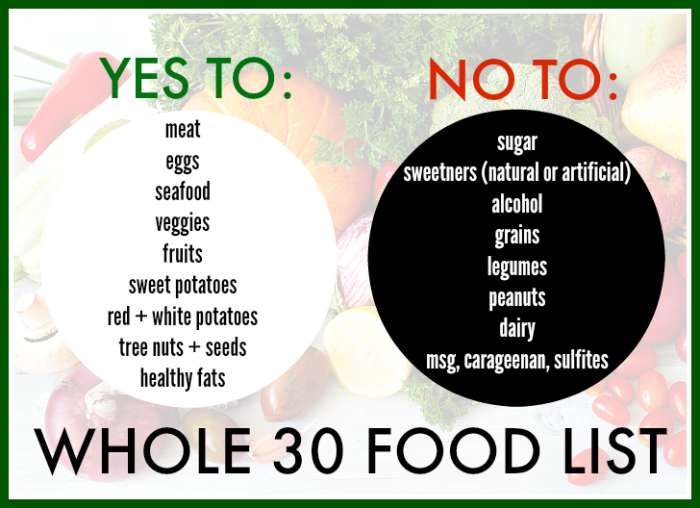The Benefits of Whole 30
Whole 30 is a popular dietary program that focuses on eliminating certain food groups for 30 days. It aims to reset your body and improve your overall health. In this article, we will explore the numerous benefits of following the Whole 30 program.
Improved Digestive Health
One of the key benefits of Whole 30 is its positive impact on digestive health. By eliminating processed foods, sugar, grains, dairy, and legumes, you allow your gut to heal and reset. This can lead to reduced bloating, improved digestion, and relief from digestive issues such as irritable bowel syndrome (IBS) and acid reflux.
Increased Energy Levels
Following the Whole 30 program can significantly boost your energy levels. By consuming whole, nutrient-dense foods, you provide your body with the necessary fuel to function optimally. Whole foods are rich in vitamins, minerals, and antioxidants, which can help combat fatigue and provide sustained energy throughout the day.
Weight Loss
Many individuals turn to Whole 30 for its weight loss benefits. By eliminating processed foods and added sugars, you reduce your calorie intake and promote fat loss. Additionally, the program encourages the consumption of protein, healthy fats, and vegetables, which can help you feel full and satisfied while supporting weight management.
Reduced Inflammation
Chronic inflammation is associated with various health issues, including heart disease, diabetes, and autoimmune conditions. Whole 30 focuses on anti-inflammatory foods, such as fruits, vegetables, and lean proteins, while eliminating potential inflammatory triggers. By following this program, you may experience a reduction in inflammation and related symptoms.
Enhanced Mental Clarity
What you eat can have a significant impact on your cognitive function. Whole 30 promotes the consumption of nutrient-dense foods that support brain health. By eliminating processed foods and artificial additives, you may experience improved mental clarity, enhanced focus, and better overall cognitive performance.
Better Sleep Quality
Following a healthy diet can positively affect your sleep patterns. Whole 30 encourages the consumption of sleep-promoting foods, such as magnesium-rich leafy greens and tryptophan-containing proteins. By nourishing your body with these nutrients, you may experience improved sleep quality, better sleep duration, and reduced insomnia symptoms.
Clearer Skin
Many individuals report improvements in their skin health after completing the Whole 30 program. By eliminating potential food sensitivities and inflammatory triggers, you may experience a reduction in acne, eczema, and other skin conditions. Additionally, the consumption of nutrient-dense foods can promote a healthy complexion and a radiant glow.
Strengthened Immune System
Whole 30 focuses on boosting your immune system by providing your body with essential nutrients. By consuming a variety of fruits, vegetables, and lean proteins, you support your immune system’s ability to fight off infections and illnesses. Additionally, eliminating processed foods and added sugars can help reduce your risk of developing chronic diseases.
Improved Relationship with Food
Whole 30 encourages a mindful and intentional approach to food. By eliminating certain food groups for 30 days and then reintroducing them gradually, you gain a better understanding of how different foods affect your body. This program can help you develop a healthier relationship with food, improve your self-control, and reduce cravings for unhealthy options.
Overall Well-being
Following the Whole 30 program can have a positive impact on your overall well-being. By nourishing your body with nutrient-dense foods and eliminating potential inflammatory triggers, you may experience increased vitality, improved mood, and a greater sense of well-being.

In conclusion, the Whole 30 program offers numerous benefits, including improved digestive health, increased energy levels, weight loss, reduced inflammation, enhanced mental clarity, better sleep quality, clearer skin, a strengthened immune system, improved relationship with food, and overall well-being. By committing to this program, you can transform your health and achieve long-lasting positive changes.
Frequently Asked Questions
1. What is Whole 30?
Whole 30 is a 30-day dietary program that focuses on eliminating certain food groups to improve overall health and well-being.
2. What are the benefits of doing Whole 30?
Whole 30 can lead to weight loss, improved digestion, increased energy levels, reduced inflammation, better sleep, and improved mental clarity.
3. Can Whole 30 help with food cravings?
Yes, Whole 30 can help reset your taste buds and reduce cravings for processed foods, sugar, and unhealthy snacks.
4. Is Whole 30 suitable for vegetarians or vegans?
Whole 30 can be challenging for vegetarians and vegans as it eliminates legumes, grains, and soy. However, modifications can be made to meet individual dietary needs.
5. Will I lose weight on Whole 30?
Many people experience weight loss during Whole 30 due to the elimination of processed foods and focus on whole, nutrient-dense foods.
6. Can Whole 30 improve digestion?
Yes, Whole 30 eliminates common food irritants and promotes a whole foods-based diet, which can lead to improved digestion and reduced bloating.
7. Are there any potential side effects of Whole 30?
Some people may experience temporary fatigue, irritability, or cravings in the initial phase of Whole 30 as the body adjusts to the dietary changes.
8. Can Whole 30 help with autoimmune conditions?
While Whole 30 is not a cure for autoimmune conditions, many individuals have reported improvements in their symptoms, such as reduced inflammation and increased energy levels.
9. Is Whole 30 recommended for everyone?
Whole 30 may not be suitable for everyone, especially those with certain medical conditions or specific dietary needs. It’s always best to consult with a healthcare professional before starting any new dietary program.
10. What happens after the 30-day Whole 30 program?
After completing the 30-day program, individuals are encouraged to reintroduce eliminated foods gradually to identify how they affect their bodies and determine their personal food sensitivities.




